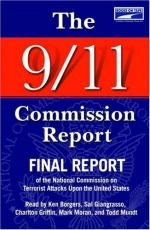|
This section contains 605 words (approx. 2 pages at 400 words per page) |

|
Chapter 11 "Foresight and Hindsight" Summary and Analysis
The 9/11 attacks exposed four kinds of failure - imagination, policy, capability, and management.
The end of the Cold War created vacuums that bred new and unexpected scenarios of instability, primarily in the Middle East and South Asia. The U.S. in the 1990s stood alone as a hyper-power. While Afghanistan dropped from the U.S. radar after the withdrawal of the Soviet Union, to the Afghans and others in Asia and the Middle East, America's power was pervasive and omnipresent.
In the two years before 9/11, the U.S. government, despite mounting piles of intelligence, failed to keep the public educated as to what al-Qaeda and Islamic terrorism was and what kind of threat it presented to national security. The ignorance of the public acted as a real constraint on U.S. policy. At...
(read more from the Chapter 11 "Foresight and Hindsight" Summary)
|
This section contains 605 words (approx. 2 pages at 400 words per page) |

|




